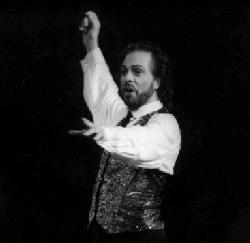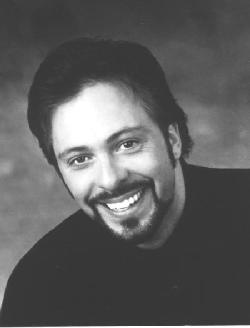Gino Quilico: Interview by Philip Anson et Wah Keung Chan
/ October 1, 1997
Version française...
 After having lived in London, Paris,
Italy and New York, 42-year old baritone Gino Quilico now calls
Montreal home. Quilico was in Montreal last August for the launch of
his first solo album, Le Secret, and for the Opéra de
Montréal’s announcement that Quilico would sing the role of Iago in
Verdi’s Otello during the 1999-2000 season. La Scena
Musicale met Qulico in his Westmount studio before he headed
south for a month of Escamillos in Bizet’s Carmen at New York’s
Metropolitan Opera. After having lived in London, Paris,
Italy and New York, 42-year old baritone Gino Quilico now calls
Montreal home. Quilico was in Montreal last August for the launch of
his first solo album, Le Secret, and for the Opéra de
Montréal’s announcement that Quilico would sing the role of Iago in
Verdi’s Otello during the 1999-2000 season. La Scena
Musicale met Qulico in his Westmount studio before he headed
south for a month of Escamillos in Bizet’s Carmen at New York’s
Metropolitan Opera.
LSM: How did
you start your singing career?
GQ: My father Louis Quilico is an opera
singer, and my mother was a concert pianist so there was always
music in the house. Till about the age of fourteen I listened to
classical music, then I got interested in pop music like every
teenager. I quit school when I was 16 and went to work in
renovation, refinishing floors, unloading Bacardi rum barrels from
freight trains, gardening, painting. I even worked in a coal mine. I
played the guitar and sang in a few nightclubs, but my voice was
very untrained. At 19 or 20, I was trying to decide what my future
would be. My father said the opera was hiring chorus extras so why
not try that. When I went on stage, I really got the bug. I asked my
parents to be honest with me and tell me if I had potential. They
said yes, so I devoted myself to singing.
LSM: Tell us
about your vocal training.
GQ: I had the luxury of having two teachers,
my mother and father, at my disposal all the time. It was more like
an apprenticeship, living with artists and learning my trade. My
first six-months training with my father there was no sound
production, just technical aspects of opening the throat. The second
six months was breathing. So the first year was just preparing the
body, the throat, the vocal cords and breath control. After that
came sound: one sound, two sounds, and so on. After six months of
sounds, we started singing arias. After two years of almost daily
study, I was completely prepared. The body is the singer’s
instrument and my whole body was tuned up. At that point, I entered
the Opera School at the University of Toronto. I did all the
non-vocal training such as acting, make-up and mime at the
university. But no theory: I never got a formal degree. I don’t
study with my father anymore. I now work with a few coaches, they
don’t touch my voice, we just work on interpretation.
LSM: Tell us
about your early career in Europe.
GQ: My first big break was when I was 24. I was
a student in Paris and signed on at the Opéra de Paris as a house
member for three years. I lived in a tiny room with roaches and a
shared bathroom. I kept my food out on the windowsill. I was poor,
but I would have sung in the metro for money if I had to - and let
me tell you, a lot of today’s stars did come up through the metros!
I once wanted to hear Domingo sing Carmen at the Opéra
Comique, but since I couldn’t afford a ticket I sneaked in and lay
on my stomach between the rows so the guards wouldn’t see me! If you
really love something, you are willing to do stupid things like
that. When I got famous I was the hot young baritone, and everyone
was going "Wow!" — it sort of turned my head. At the time of the
Orfeo movie around 1979 or 1980, my agent
booked me in a terrible hotel in Geneva, a real dump. I said "How
dare they book the star in a dump!" and I kicked up a fuss. But then
the place reminded me of my first apartment in Paris, so I stayed
and decorated it with posters like I had done as a student. That
brought me down to earth. I still expect things to be professional
and correct in matters like costumes that affect my art, but I’m not
a Divo.
LSM: Why did
you return to North America?
GQ: I lived in Paris for fourteen years, but
then that summer of the bombings I witnessed an explosion. A car
blew up and forty kids were injured. If I had been there fifteen
seconds later, I would have been dead. I was traumatized because I
had an infant son and a pregnant wife to support. I decided I
couldn’t take risks like that. So we moved to London and two years
later a bomb went off at Harrods! Europe was getting too aggressive,
too dangerous, so I said "I’m out of here." That’s why I left
Europe, not for career reasons.
 LSM: Do you
consider yourself a Montrealer? LSM: Do you
consider yourself a Montrealer?
GQ: Montreal definitely feels like home. My
grandfather came here from Italy and opened the first bicycle store
in Montreal on Rue St-Denis. My father and mother were born here. I
can work out of Montreal because it has good airports. It is also a
good place for my children, who go to a private English school. As
for Bill 101, my wife was educated in English in Toronto, so our
children can be educated in English. I want them to have English and
then French and other languages if they want. If I didn’t have the
right to choose which language our children learned in, I wouldn’t
be very happy. English is an important language to have these days.
LSM: What about the controversy
surrounding your withdrawal from the Opéra de Montréal’s Eugene
Onegin?
GQ: There has been a lot of confusion about
that incident. In fact, I cancelled because I didn’t feel ready to
sing the role. I had about one year to prepare, and when I realized
that there was no way I could pull it off in a year I cancelled -
not at the last minute, but a year before the show. It wasn’t that I
didn’t want to sing it. I did, but a title role takes so much work,
especially when it is in Russian, which is hard to learn. I never
take the risk of being unprepared. That wouldn’t be professional or
fair to the audience.
LSM: You have
complained that Canadian opera companies don’t hire enough
Canadians.
GQ: Yes, I said that, but I really intended
my remarks to be taken generally, not about any particular
institution. Canada has lost so much talent abroad - singers,
actors, painters, poets - that we are impoverishing ourselves. It is
really a national problem. However, my words were distorted by the
press. I really don’t remember saying half the things I was quoted
as saying. Journalists often work their own opinions into
interviews.
LSM: Yet the
Opéra de Montréal has passed you over for several of your most
famous roles, such as Don Giovanni and Figaro.
GQ: I don’t really know what the Opéra de
Montréal has been staging, but I couldn’t do most of them anyway due
to scheduling conflicts. There are lots of operas everywhere I am
not asked to do. It’s not like every time there is a Don Giovanni it
has to be me. It’s hard to find time to do everything you want to
do. We were lucky to find a slot in 1999-2000 for the Opéra de
Montréal Otello.
LSM: Some
people say you may have accepted a lower fee than usual in order to
sing at the Opéra de Montréal.
GQ: The Opéra’s offer was quite
respectable.
LSM: You sang
at the Opéra de Montréal Gala last year for free?
GQ: Yes, that was a complete benefit.
LSM: Did you do
that Gala to make peace?
GQ: Yes, it was a gesture.
LSM: Tell us
about the evolution of your voice and rep.
GQ: I started with the lyrical rep, a bit of
baroque, a lot of Rossini, a lot of French music, a couple of world
premieres of new compositions. Now I’m sticking mainly to my strong
roles and moving toward the Verdi roles, which is the top of a
baritone’s career. Eventually it would be great to sing Verdi all
year long, but I’m being careful. Men shouldn’t sing Verdi in their
thirties unless they are born with the Verdi sound, otherwise they
get tired and wobbly. I do about forty or fifty performances per
year and I prefer long runs - six shows or more. I once did 15
Otellos in Germany and that was great
because it gave me a chance to get into the character until it
became second nature.
LSM: Which
roles do you want to keep in your rep as you move into
Verdi?
GQ: Don Giovanni, Barbiere,
L’Elisir; Marcello in La Boheme is a great part I’d be
glad to sing forever. Onegin is new, but I want
to keep doing that one. Once I am really into the Verdi, I probably
won’t go back to Rossini. For the last four years I’ve been getting
into recitals. Recitals are great because they are intimate and
personal.
LSM: Any advice
for young singers?
GQ: The first thing is to get your technique
straight and get your voice on track. These days students start with
repertoire before they are masters of their instrument. Unless you
are 150% confident when you step onstage, you’ll fail. When I did my
auditions I was so secure that I "ate" the audience, and they had no
choice but to hire me. If you hesitate even a bit, you will get
eaten. Also, you have to be confident and motivated. I sang with
Roberto Alagna when he was unknown, but I knew he’d be a star
because he had drive. People think it was easy for him, but they
forget that he used to work in a bar singing pop songs. Good singers
will always be found. Quality wins out over dishonesty and evil. But
if you are just after fame, forget it.
w
Gino Quilico will
be launching his new solo album Le Secret at a record signing at the
HMV Megastore (St-Catherine St.) in Montreal on October 18 at 2
p.m.
Version française... | 

